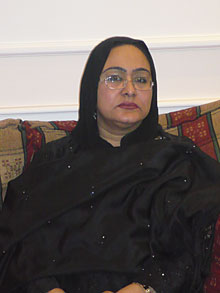JEDDAH: A Pakistan federal minister put the blame squarely on successive military regimes for the Talebanization of Pakistan, and said the current crisis in the tribal region is threatening to rend the nation’s ethos.
Minister of State for Religious Affairs Shagufta Jumani said if one person is to be blamed for the rise of Taleban militancy in the country then he is the late President Zia-ul-Haq. “It was during Zia-ul-Haq’s regime in 1978 that militancy took root with the patronage and support from various government agencies,” she said.
“Since its inception, the country was ruled for the majority of the years by military regimes with brief interludes of democracy. There was no real opportunity for dialogue with these elements, and the military governments always tried to solve these issues with the use of force. “The previous government too dealt with them primarily on military levels giving them more space to spread their tentacles.
“They used propaganda judiciously and gained sympathizers by spreading the fact that Pakistan was fighting America’s war on terror,” she said, adding, “Militancy cannot be curbed at once by force, it will take time and needs multipronged strategy, including dialogue, to eliminate it.”
The minister said as far as “the latest military operations in Swat Valley in Malakand and Hazara division are concerned they have been launched to save the country from disintegration and to flush out foreign terrorists from our land.” She said that for quite some time these areas were practically out of the government’s control and it was important for the country’s safety, security and peace that the writ of law was established there. “We are not fighting America’s war as some people call it... we are fighting to keep Pakistan intact, to keep all its provinces together.” The minister said that most of the militants in the troubled region are foreigners like Chechens, Uzbeks, Tajiks and Arabs. She said that these elements had made Swat their safe haven and were getting support from some of “our neighbors.”
She also emphasized that there is no rift between President Asif Ali Zardari and Prime Minister Yousaf Raza Geelani, calling all the hullabaloo as “media hype.”
Jumani, who is also general secretary of the Pakistan Peoples’ Party’s (PPP) women’s wing, said that the PPP and the late Benazir Bhutto were always opposed to these forces and wanted to rid the country of these elements to strengthen Pakistan and that was one of the reasons she was killed.
She blasted Taleban and their sympathizers for giving a bad name to Pakistan and distorting the teachings of Islam by abolishing schools and shrines. “Islam promotes tolerance. It calls for education without any discrimination on the basis of gender, and they are destroying girls schools and are killing those who oppose them. What type of Shariah they want to enforce,” she asked.
When reminded that her government has signed a deal with Taleban for the implementation of Shariah in the region, Jumani said that the bill was firstly passed by the NWFP Assembly and then it was approved by an overwhelming majority in the National Assembly, leaving no room for its rejection by the president.
But it was always crystal clear that the bill was passed for reconciliation, peace and harmony in the region...and when those objectives were not achieved...the deal was bound to collapse, Jumani said.
Talking about this year’s Haj arrangement, the minister said she was trying her best to provide best services to about 200,000 pilgrims expected this year from Pakistan.
“This year all pilgrims will come on machine readable passports as per the latest Saudi guidelines. Arrangements are being made to provide passport to pilgrims in 5-7 days.” Furthermore, Pakistan is an Islamic country so “we are trying to provide women pilgrims with “Abayas.” These could be a traditional abayas or some long coats or something that fulfills religious requirement. We have also talked to the South Asian Establishments to provide every pilgrim with a blanket, pillow and a mattress.”
The minister during her stay in Jeddah, visited Pakistan International School (English section) and praised it for all-round development under its acting Principal Sehar Kamran.


